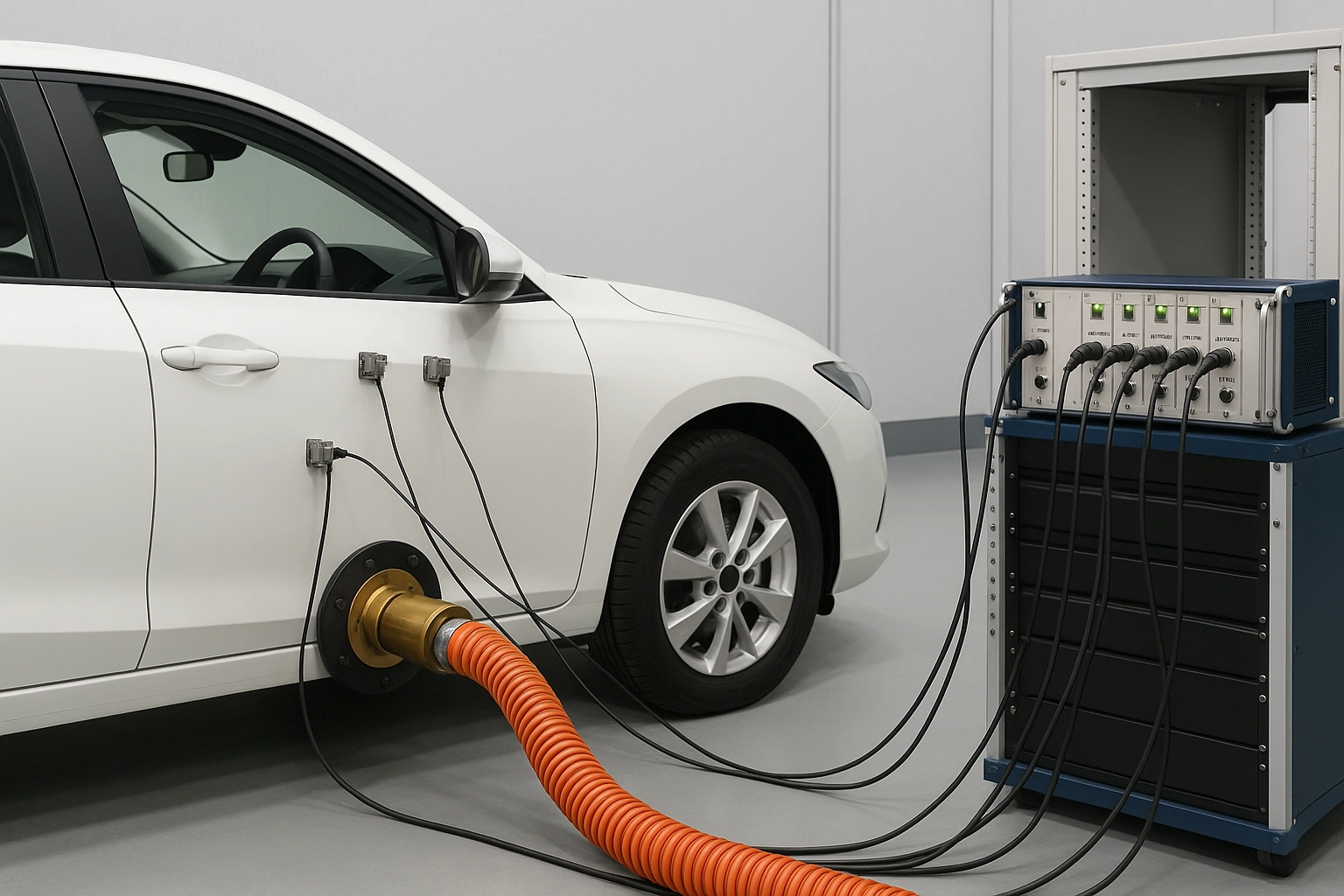FMVSS 216 Roof Crush NVH Testing
The Federal Motor Vehicle Safety Standard (FMVSS) 216 specifies requirements for roof crush resistance in passenger cars, sport utility vehicles, and vans manufactured after September 1, 1971. The purpose of this standard is to ensure that the structural integrity of a vehicle's roof can withstand significant forces without collapsing during an accident. Roof crush testing under FMVSS 216 is crucial for ensuring safety compliance in the automotive industry.
The test involves applying a specified load vertically to the roof using hydraulic equipment until failure occurs or up to a maximum load of 5,000 pounds (approximately 22 kN). The specimen preparation includes mounting the vehicle's roof on a rigid frame with specific boundary conditions. The loading is applied at a rate that simulates real-world crash scenarios.
The testing procedure must adhere strictly to FMVSS 216 requirements, which dictate precise load application rates and environmental controls for temperature and humidity. The test apparatus typically includes hydraulic presses capable of applying the required forces accurately while measuring deflection and stress distribution in real-time. Post-test inspections involve examining the roof structure's integrity and assessing any deformation or damage.
The FMVSS 216 test results are critical for ensuring that vehicles meet safety standards and can be trusted by consumers. Compliance with this standard is mandatory, and non-compliance could result in significant financial penalties and reputational damage for manufacturers.
Our laboratory ensures the highest level of accuracy and precision in all FMVSS 216 tests, leveraging state-of-the-art equipment and experienced technicians. We provide detailed reports that include not only compliance status but also insights into potential areas for improvement. This information is invaluable for quality managers, R&D engineers, and procurement teams looking to enhance vehicle safety.
Our testing services are widely recognized in the automotive sector due to our rigorous adherence to international standards such as FMVSS 216. We have a proven track record of delivering reliable test results that meet or exceed industry expectations. Our clients can trust us to provide accurate and timely data, ensuring they stay compliant with regulatory requirements.
Scope and Methodology
The scope of FMVSS 216 Roof Crush NVH Testing encompasses the structural integrity testing of vehicle roofs under specified loading conditions. The methodology involves mounting a representative section of the roof on a rigid frame, applying a vertical load to simulate real-world crash scenarios, and monitoring deformation and stress distribution throughout the test.
The testing process begins with specimen preparation, which includes ensuring that the roof is free from any defects or imperfections that could affect the outcome of the test. The boundary conditions are carefully set up to ensure accurate loading and measurement.
- Specimen Preparation: Ensuring the roof section is clean, free of cracks, and undamaged before testing.
- Loading Equipment: Utilizing hydraulic presses capable of applying loads up to 5,000 pounds (approximately 22 kN).
- Data Acquisition: Continuous monitoring of deflection, stress, and strain using high-precision sensors.
The loading rate is critical in simulating real-world conditions accurately. Our laboratory uses advanced software to control the loading rate and ensure it adheres strictly to FMVSS 216 specifications. Post-test inspections involve a comprehensive examination of the roof structure for any signs of failure or damage. Any deviations from expected results are documented, providing valuable insights into potential areas for improvement.
The testing environment is controlled to maintain consistent temperature and humidity levels, ensuring that test conditions are as close to real-world scenarios as possible. This attention to detail ensures accurate and reliable test results.
Customer Impact and Satisfaction
Clients benefit significantly from our FMVSS 216 Roof Crush NVH Testing services, which contribute to their overall quality management strategies by ensuring compliance with safety regulations. By providing accurate and detailed test results, we help clients make informed decisions regarding design modifications and material selection.
Our testing process is designed to identify potential weaknesses in the roof structure early in the development cycle, allowing for corrective actions before production begins. This proactive approach not only enhances product safety but also reduces costly recalls and reputational damage associated with non-compliance issues.
The insights gained from our comprehensive test reports are invaluable for quality managers looking to optimize manufacturing processes and improve overall product reliability. R&D engineers can leverage this data to innovate and develop safer vehicle designs, while procurement teams benefit from knowing they are sourcing components that meet strict safety standards.
Our commitment to excellence is reflected in the high satisfaction levels of our clients. We continuously strive to exceed expectations by delivering timely, accurate results and offering expert guidance throughout the testing process. This dedication ensures that our customers can confidently market their products as compliant with FMVSS 216 requirements.
International Acceptance and Recognition
- ISO/TS 16949: Our laboratory is ISO/TS 16949 certified, ensuring that our processes meet the stringent quality management system requirements of the automotive industry.
- AACC (Automotive Accidents and Crashworthiness Conference): We present our research findings at AACC conferences, sharing insights on FMVSS compliance with leading experts in the field.
- IATF 16949: Compliance with IATF 16949 standards further underscores our commitment to maintaining high-quality testing processes and ensuring reliable results.
Our laboratory's FMVSS 216 Roof Crush NVH Testing services are widely recognized across the global automotive industry. Our adherence to international standards such as ISO/TS 16949, IATF 16949, and AACC ensures that our clients can trust us for accurate and reliable testing results.
We regularly participate in collaborative research projects with leading institutions and organizations worldwide, contributing to advancements in automotive safety technology. Our reputation for excellence has earned us a place among the trusted providers of FMVSS 216 compliance testing services globally.





